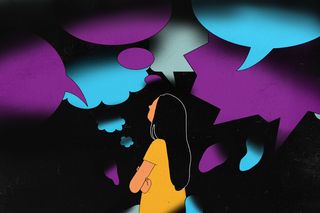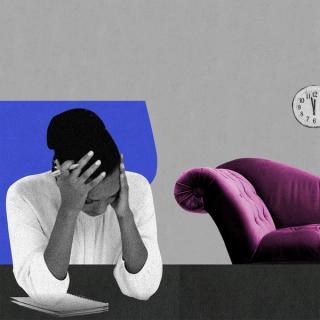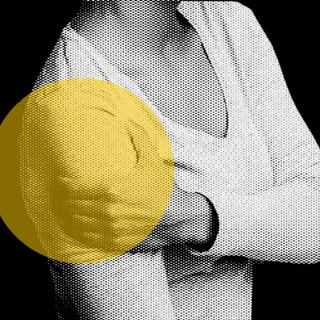
What It’s Like to Live With: Asperger Syndrome
“I’m quite happy with my brain, actually.”

What It’s Like to Live With explores the stories of people who see and experience every day a little differently.
I’m 29, and while growing up, like any other child, I had my own set of issues. But, I also had some more unique issues, which I’m only starting to understand now.
I was diagnosed with being on the spectrum only last year. I have a very big weight problem, because of which my mother asked me to visit my aunt’s friend, who is a counselor, in April 2019. She told me later that during the very first meeting, she had figured out that I’m on the spectrum — but she waited to tell me until she was sure that I would be able to take it. That was about four months after I first met her. She explained to me what it meant because I didn’t really know much about autism, honestly. So, until then, it had never occurred to me to even think that I could be on the spectrum. But, after we spoke, I also did some research on my own. I did a lot of self-evaluation, and it all made sense to me.
My life as an adult has been relatively easier than when I was a girl. As a child, it was really, really bad. I was quite bad at making friends. Nothing ever made sense to me. Why are people doing what they are doing, why are they reacting the way they are reacting, when am I supposed to speak, what am I supposed to say — these are all so stress-inducing. I think my absolute biggest challenge is social interaction. Even making eye contact causes me stress — if I try to do it, all of my attention goes into maintaining eye contact, and I’m not able to pay attention to what the person is saying. So instead, I focus on the person’s lips when they’re talking.
When I was 19, I went to college. And I think being away from home kind of helped me because for the first time, I was surrounded by people my age, and we were all interested in pursuing the same things in life — so, I had something in common with them. I kind of started opening up for the first time in my life, but I also think that that is the point when the camouflaging actually kicked in. I was no longer in the familiar surroundings of home; I was around people I didn’t know at all. I was trying very hard to be like the other girls my age, and I succeeded — to some extent. There were days when it felt very good to ‘fit in,’ but they were days when it really took its toll on me. But back then, I didn’t know why it was so exhausting to be around other people; now, of course, I do. But, I was able to make more and better friends than when in school. And, eventually, they became more understanding.
“It can be exhausting to explain to [people] that what they see and what is actually happening with me are two very different things.”
I’ve lived with anxiety my whole life. In fact, today, I have to take medication. I can’t function without it. Even now, say every two days out of 10, if I mentally prepare myself to go out and socialize, and do all other ‘normal’ things — then I just need the remaining eight days to recharge, and be away from everyone and everything.
I’ve had some challenges at work too. I’m a lawyer, and I used to work at a law firm. Law firms are anyway difficult for even neurotypical people, and for a person who has trouble understanding social cues, understanding what the other person is trying to say — it’s worse. It’s very confusing. I’m in-between jobs now and, hopefully, I’ll find something that won’t require me to go back to a law firm anymore. But I am also very, very bad at giving interviews. I write very well, I do my job well, but talking during an interview is the challenging part.
Related on The Swaddle:
I Self‑Diagnosed My Autism Because Nobody Else Would. Here’s Why That Needs to Change.
I have a very, very active mind. Like, my mind is constantly working, it never shuts down. So, I have a problem with sleep as well, which again means I have to take sleep medication. Otherwise, I’m not able to function during the day because I’m not getting any sleep. Then, there are the sensory things: I’m quite particular about what food I eat; I don’t like scratchy or itchy things to touch, labels in clothes really irritate me. When I was a child, I did not like people touching my hair or my nails — even to cut them. Even sights and sounds can be overwhelming — I look for dim lights wherever I go.
I do have coping mechanisms that have all developed subconsciously. I think my number one thing is to hide under my blanket — I turn on the A/C, because I cannot stand the hot weather, and I just curl up under my blanket. I keep a lot of stuffed toys around me since I love the feel of soft, furry things. I just make a cocoon for myself, and I just stay there and don’t come out. The other times, when I can’t get inside my blanket; I kind of just escape into my head — I create a world for myself, where things are not so bad, and where I feel more valued, maybe, than I do in real life.
I also used food as a way to escape, which is the coping mechanism that caused me to develop issues with my weight over the years, and eventually, as I mentioned, led me to the counselor. Right after social interactions, I tend to eat a lot, and I eat wrong because I need to comfort myself. And we found out that I had been doing this since childhood, and that’s why I’ve kind of been overweight my whole life.
“I’m quite happy with my brain, actually.”
When I share my diagnosis with other people, sometimes they tell me: “Oh, but you’re not like that.” It can be exhausting to explain to them that what they see and what is actually happening with me are two very different things. First, traits are different for different people, it varies for men and women, and then there’s the camouflaging. When someone says “autism,” people tend to associate it with intellectual disabilities or, maybe, language disabilities. So, while the process of getting to the diagnosis wasn’t difficult, some of the reactions I got from people around me were a little hurtful, because they would doubt my diagnosis or simply call it incorrect. People don’t want to listen to facts before making judgments.
I’m quite happy with my brain, actually. I have a very active imagination. Somehow, I feel like I have a different way of looking at things, which makes life interesting for me. I like that my brain thinks a lot and feels a lot and comes up with so many new ideas.
When I found out about my diagnosis, it was a relief — a relief to know that there is a name to whatever has been happening to me, that there are explanations; it’s not just me going crazy in my head. You kind of know that you have been different your whole life, and then you find out that it’s not because you weren’t trying hard enough or that there’s a character flaw in you. I spent my whole life hating myself for not being like everyone else, for not being normal. The word “autism” doesn’t scare me — it is what it is.
This interview has been condensed and edited for clarity. As told to Devrupa Rakshit.
Devrupa Rakshit is an Associate Editor at The Swaddle. She is a lawyer by education, a poet by accident, a painter by shaukh, and autistic by birth. You can find her on Instagram @devruparakshit.
Related


India’s Mental Health Professionals Are Burning Out Amid the Pandemic Rush on Their Services
